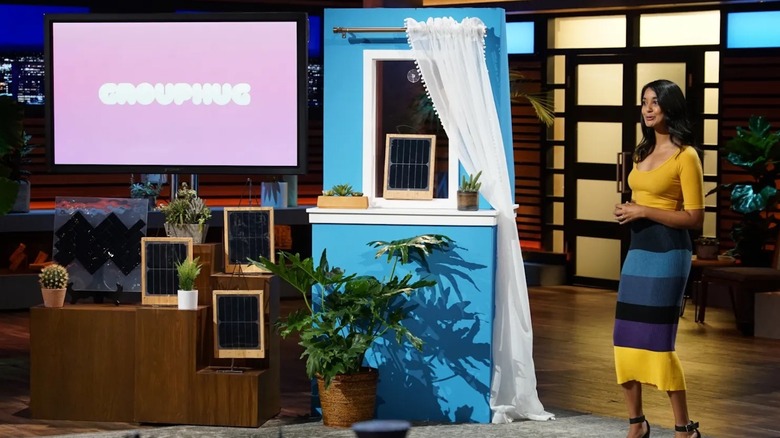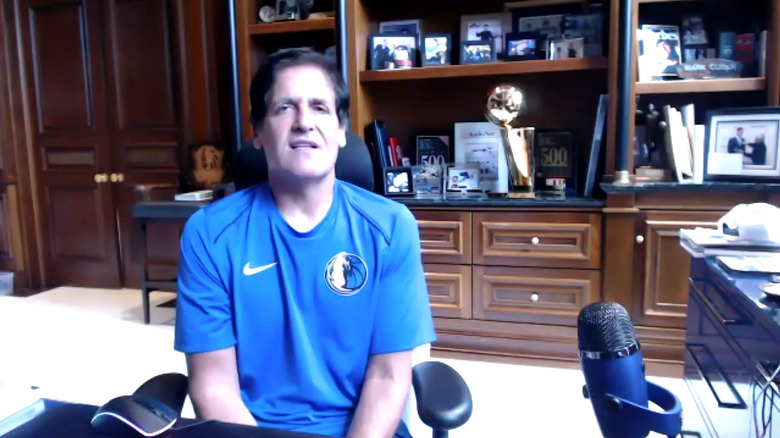What Happened To Grouphug Solar Panels From Shark Tank Season 11?
The 16th episode of the 11th season of ABC's "Shark Tank" premiered on March 20, 2020 to an audience of 5.99 million people according to Nielsen Media Research's viewership ratings. (Just days into COVID-19 lockdowns, it was easily the most-watched episode of the season.) The third of four pitches featured in the episode was for Grouphug, a start-up making window-mounted solar chargers for USB devices. Though only at the prototype stage at the time, the project had done well on Kickstarter, but founder Krystal Persaud needed help seeing it through. Though some sharks were down on the product, and the prototype's specs were pretty meager with just a 2,200 mAh battery, she managed to make a deal for an investment while in the tank. In fact, in a "Shark Tank" rarity, all four of that week's pitches ended in a deal being made on-set.
However, as noted above, the episode aired as the United States was locking down due to the COVID-19 pandemic, which wreaked havoc on supply chains around the world. Still, Persaud and Grouphug managed to ship its standard Kickstarter pre-orders six months later and the deluxe versions the following year. Even as COVID cleared, though, Grouphug exhausted its stock on hand, eventually experiencing more than two years of delays before taking pre-orders for a revised chargers. The company looks functional, albeit not as a major priority for Persaud as she's moved on to other jobs. Let's take a detailed look at how it ended up this way.
What happened to Grouphug on Shark Tank?
31 year-old Krystal Persaud entered the tank seeking a $150,000 investment for a for 10 percent equity stake in Grouphug, her company making small solar panels that apartment dwellers can place in their windows. As an environmentally-conscious millennial, she wanted to introduce solar power into her life to reduce her carbon footprint, but as someone renting an apartment in New York City, this was much easier said than done. There was nothing purpose-built for placing in a window, just portable solutions for camping trips and the like, so she invented the Grouphug window solar charger to fill the gap in the market. With a 10W panel and a 2,200 mAh battery, Persaud claimed that the battery in the prototype-stage Grouphug panel could charge "anything small, USB-related." That's putting it lightly since it 2,200 mAh isn't enough to charge most modern smartphones.
Kevin O'Leary opted out because he felt it would be too hard to make money with, while Lori Greiner followed because she felt it was way too early for an investor to come in. Barbara Corcoran thought Persaud did a great job with her pitch, but bowed out because she felt the prototype's design "just plain out looks ugly" and that it would be a long, difficult road getting to market. Guest shark Rohan Oza followed her over the lack of proprietary technology. Mark Cuban, though, feeling there was potential in custom corporate installations, offered $150,000 for 25 percent, and Persaud agreed.
Grouphug after Shark Tank: Are they still in business?
As one of Mark Cuban's deals, we should be able to learn whether the deal closed via the "Shark Tank" page on Cuban's official MarkCubanCompanies.com website. Grouphug isn't listed there, and normally — barring a name change post-"Shark Tank" like Ilumi — this means that the deal didn't close. However, in May 2020, two months after Grouphug's episode aired, Cuban appeared with Persaud in an interview on Grouphug's YouTube channel where she explicitly called him "my investor" and he referenced "the reasons I invested in Grouphug." It seems safe to assume the deal closed, meaning that Cuban's "Shark Tank" investments page may be out of date as a result. However, he hasn't really publicly associated himself with Grouphug since.
Grouphug's still around, but it hasn't gotten far. COVID-19 seemingly slowed Grouphug's growth, with a Kickstarter campaign funded in mid-2019 not shipping until September 2020 for regular chargers and May 2021 for deluxe models. Upon release, it appeared on recommendation lists, including Reader's Digest's 2021 tech gift guide, which did not continue into the 2022 version of the list. It looks like the Grouphug charger remained sold out for the rest of 2023, and waitlisted deep into 2024 despite the website claiming it would be restocked early in 2024. The most recent cached copy on The Wayback Machine, from October 3, 2024, says the same thing; they're now promised to ship March 15, 2025.
What's next for Grouphug and its founder?
Even if the second edition of the Grouphug Window Solar Charger ships as promised, it doesn't seem like the brand will be readily available on store shelves any time soon. The pre-order page even highlights how conservatively the company spends its money. "Every time we release a new batch of products, they sell out immediately!," it reads. "As a small business, pre-orders help us plan inventory and craft the perfect amount." Those aren't the words of a company that's planning on entering any kind of significant growth stage anytime soon, despite one of the points of "Shark Tank" theoretically being to get companies past that level.
As for Krystal Persaud, it looks like the pandemic's effects on Grouphug drove her to make it less of a priority. According to her LinkedIn page, she co-founded Wildgrid, another solar power company, in March 2022, serving as the company's head of product through November 2023. She's still involved there as an advisor, but that's not her full-time job anymore, either. Instead, in January 2024, she joined Spin Master, a toy company that's probably best-known for the iconic Rubik's Cube brand of three-dimensional puzzles, to work in research and development. "Thrilled to join Spin Master to bring the next generation of iconic toys to life," reads her LinkedIn description of the Spin Master job. "I'm focused on future product strategy. In summary, PLAY ALL DAY!"



